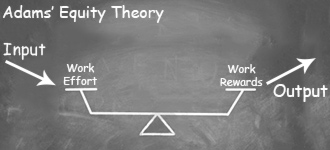Equity theory was first developed by John Stacey Adams in 1963 who was a workplace psychologist, and it may just hold the answers to some of the big questions regarding happiness and life satisfaction. Essentially it describes a situation in which a person or persons derive their sense of happiness, accomplishment and satisfaction from comparisons with others around them.
How Happiness Is Derived According to Equity Theory
In other words then, if you were working for a large corporation and getting paid 30k a year, then you might well find this unsatisfactory if everyone else in the organization was earning 35k, and if all your friends were between 35-50k. You would feel like you were being treated unfairly, and at the same time you would feel relatively less successful and cared for.
 At the same time though, if you were earning 30k in the same job, but everyone else working there was only earning 20, and your friends were all on salaries of around 15, then you’d be the ‘richest’ of your group and the best paid in your organization, and as such you would be the happiest and you would feel the most satisfaction.
At the same time though, if you were earning 30k in the same job, but everyone else working there was only earning 20, and your friends were all on salaries of around 15, then you’d be the ‘richest’ of your group and the best paid in your organization, and as such you would be the happiest and you would feel the most satisfaction.
Why Do We Compare?
This is sometimes described as one of the justice theories, and the idea here is that dissatisfaction with relatively low pay will come at least partially from the feeling of injustice that comes from being given less than other people who are in the same circumstances as you. However this is far from being the only way that equity theory works – and it’s not just about justice. Even if the situation existed purely by chance, you would still be dissatisfied with earning less than everyone else, and this would be simply because you would be using them as a basis of comparison. Your colleagues and those around you form the spectrum of what’s possible and provide the context in which you can measure your success. If you come at the bottom then this can simply tell you that you could have more, and might also make you question your accomplishments and your success.
Equity theory can also be described as a ‘motivational’ theory, much like Maslow’s Hierarchy of Needs in that it propels us to greater achievements. In this respect it could clearly have been a result of evolution – we evolved to try to accumulate the best resources and circumstances out of our social groups because this way were able to be the most socially dominant and to increase our chances of survival. Studies have shown that the effect is strongest within our close social circles, and stronger when the other people are more similar to ourselves – which would further support this view.
Overcoming Equity Theory
There are many different ways that we can try to overcome the urge to compare ourselves to others, and in doing so we can lead happier lives that are less dependent on others and more stable and resilient to change as a result.
Carrell and Dittrich in 1978 for instance proposed the ‘fairness model’ which suggests teaching people to judge fairness based on inputs and outputs based on an internally derived standard. Short of reading up on this model however, you can achieve something similar simply by opting to compete with yourself rather than other people. Being motivated to do better of course is a good thing, and so you do need a standard to strive for – but if you are basing this on the success of others you will end up becoming jealous and potentially destructive and never being completely satisfied with your achievements.
Instead look within and think about what it is that you want to achieve. Take responsibility for the outcomes in your life and recognize that only you can really improve your situation. Then set a goal based on your own needs and wants and what you are genuinely capable of achieving and shoot for that rather than trying to ‘beat’ the Jones’. This will lead to a much healthier way to motivate yourself which will give you a feeling of satisfaction and contentment while keeping you moving forward as nature quite clearly intended.



